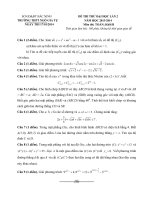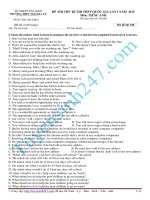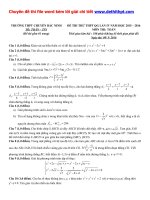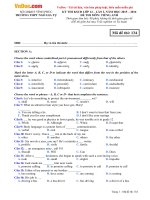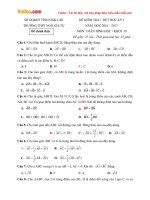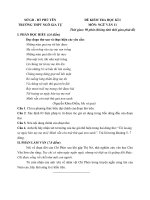THPT Ngo Gia Tu lan 4 nam 2016
Bạn đang xem bản rút gọn của tài liệu. Xem và tải ngay bản đầy đủ của tài liệu tại đây (142.84 KB, 7 trang )
<span class='text_page_counter'>(1)</span>SỞ GD&ĐT VĨNH PHÚC TRƯỜNG THPT NGÔ GIA TỰ. KỲ THI KSCĐ LỚP 12 LẦN 4. NĂM HỌC 2015 - 2016 Môn thi: Tiếng Anh Thời gian làm bài 90 phút, không kể thời gian giao đề (Đề thi gồm 64 câu trắc nghiệm và 02 câu tự luận) Mã đề: 135 SBD: ………………… Họ và tên thí sinh: ……………………………………………………………….. SECTION A (8 points) Mark the letter A, B, C, or D on your answer sheet to indicate the word whose underlined part differs from the other three in pronunciation in each of the following questions. Câu 1: A. comb B. common C. home D. dome Câu 2: A. said B. trait C. maid D. faith Mark the letter A, B, C, or D on your answer sheet to indicate the word whose stress differs from the other three in pronunciation in each of the following questions. Câu 3: A. documentary B. understand C. disappear D. experience Câu 4: A. assassinate B. agriculture C. asset D. controvert Câu 5: A. creation B. electronic C. alive D. musician Mark the letter A, B, C, or D on your answer sheet to indicate the correct answer to each of the following questions. Câu 6: Young people have become increasingly committed ______ social activities. A. of B. to C. in D. at Câu 7: The company employs a_________ of nearly 6000. A. workman B. workout C. workload D. workforce Câu 8: _______ the time their babies arrive, the Johnsons hope to have finished painting the nursery. A. For B. In C. Till D. By Câu 9: Vietnamese marksman Nguyen Manh Tuong, who owned five gold medals during the Games, was awarded the most_________athlete title. A. impressive B. remarkable C. outstanding D. admirable Câu 10: We are_________ to encourage more local employers to work with us. A. interested B. satisfied C. willing D. keen Câu 11: Water polo was the first_________ sport added to the Olympic program in 1900. A. adventure B. team C. individual D. spectator Câu 12: The _________ part of the week is always busy for me. A. early B. near C. start D. front Câu 13: Microwaves are used for cooking, telecommunications, and ______. A. medical diagnosing B. to diagnose medically C. diagnosed medically D. medical diagnosis Câu 14: The Party and State leaders, delegates, _________ and international guests, and 11 sports delegations from Southeast Asian countries to the 22nd SEA Games were warmly welcomed. A. host B. family C. household D. domestic Câu 15: The host country, Laos, is expected to announce _________ sports for 25th SEA Games in November 2008. A. official B. key C. core D. main Câu 16: When the company had to close because of economic difficulties, many people became _____ . A. deliberate B. homeless C. unsatisfactory D. redundant Câu 17: _________, the athlete broke the world's record with two attempts. A. Surprise B. Surprised C. Surprising D. Surprisingly Câu 18: He just couldn't open the jar _______ hard he tried. A. whatever B. however C. moreover D. even.
<span class='text_page_counter'>(2)</span> Câu 19: Your task is _____ mine but I have to be there all day. A. like to B. alike C. similar to D. same like Câu 20: Not once did I see him ______ a finger to help in the home. A. move B. lift C. click D. shift Câu 21: On behalf of the referees and athletes, referee Hoang Quoc Vinh and shooter Nguyen Manh Tuong _________ an oath of "Solidarity, Honesty and Fair Play". A. spoke B. said C. swore D. told Câu 22: ______ about gene-related diseases has increased is welcome news. A. Scientific knowledge B. It was scientific knowledge C. Though scientific knowledge D. That scientific knowledge Câu 23: A vacuum will neither conduct heat nor ______. A. transmit sound waves B. transmitting sound waves C. sound waves are transmitted D. the transmission of sound waves Câu 24: _______, the young mother appeared visibly very happy after the birth of her child. A. She was tired B. Tired as she was C. As tired D. Despite tired Read the following passage and mark the letter A, B, C or D on your answer sheet to indicate the correct answer to each of the questions. ACADEMICS AREN’T THE PROBLEM Studies about how students use their time might shed light on whether they face increased academic and financial pressures compared with earlier eras. Based on data about how students are spending time, academic or financial pressures don’t seem to be greater now than a generation ago. The data show that full-time students in all types of colleges study much less now than they did a generation ago - a full 10 hours a week less. Students are also receiving significantly higher grades. So it appears that academic pressures are, in fact, considerably lower than they used to be. The time-use data don’t suggest that students feel greater financial pressures, either. When the time savings and lower opportunity costs are factored in, college appears less expensive for most students than it was in the 1960s. And though there are now full-time students working to pay while in college, they study less even when paid work choices are held constantly. In other words, full-time students do not appear to be studying less in order to work more. They appear to be studying less and spending the extra time on leisure activities or fun. It seems hard to imagine that students feeling increased financial pressures would respond by taking more leisure. Based on how students are spending their time then, it doesn’t look as though academic or financial pressures are greater now than a generation ago. The time-use data don’t speak directly to social pressures, and it may well be that these have become more intense lately. In one recent set of data, students reported spending more than 23 hours per week either socializing with friends or playing on the computer for fun. Social activities, in person or on computer, would seem to have become the major focus of campus life. It is hard to tell what kinds of pressures would be associated with this change. Câu 25: The study’s conclusion that students’ workload now is not greater than before is based on_________. A. what students achieve with greater load B. how students work through college C. how students spend their time D. what college demands from students Câu 26: Research studies have shown that pressures put on students nowadays are __________. A. more diversified B. getting ever greater C. not greater than the past D. much greater than the past Câu 27: Students get higher grades as__________. A. academic workload appears less demanding B. academic workload appears more attractive.
<span class='text_page_counter'>(3)</span> C. students study much harder D. college’s facilities are much better Câu 28: According to the author, the fact that students have more time for leisure is a proof that_____. A. they are active with extra-curricular activities B. they cannot find extra jobs C. financial pressure on students is not a problem D. academic work disinterests them Câu 29: All factors considered, college now seems___________ . A. ever more expensive B. much more expensive C. more costly D. less expensive Câu 30: According to the author, the fact that more full-time students are working for pay________. A. shows that students are financially pressured B. indicates that students are academically pressured C. is not an indication of pressures D. does not change students’ campus life Câu 31: Students nowadays seem to be studying less and__________. A. taking more extracurricular activities B. giving more time to sports C. spending more time doing odd jobs D. spending more time on leisure Câu 32: The word “focus” in the last paragraph can be replaced with__________. A. biggest importance B. headline C. central activity D. primary theme Câu 33: The author finds it hard to point out___________. A. what is associated with the change in students’ campus life B. how students’ campus life becomes subject to academic pressure C. how the background of students’ campus life is built D. the cause to students’ financial pressure Câu 34: The word “Academics” in the title mostly means___________ A. professors and research students B. students’ workload in college C. graduate students’ workload D. college students and tutors Mark the letter A, B, C or D to indicate the word or phrase that is CLOSEST in meaning to the italic part in each of the following questions. Câu 35: The notice should be put in the most conspicuous place so that all the students can be wellinformed. A. easily seen B. beautiful C. popular D. suspicious Câu 36: Property prices have gone up, then gome down, then gone up again this year. A. fluctuated B. fallen C. changed D. increased Câu 37: He didn’t bat an eye ( eyelid / eyelash) when he realized he failed the exam again. A. didn’t show surprise B. wasn’t happy C. didn’t want to see D. didn’t care Read the passage and mark A, B, C, or D to indicate the correct answer to each of the blanks. My younger sister is a potential star of state and screen, or at least that's what she tells me. Last week she had an interview. It was for the (38)……………..of Juliet in Shakespear’s Romeo and Juliet. It went well and she starts (39)……………..next week. This is the first play that she has been in, but she has done quite a lot of TV advertising work and she has been in a couple of films. The last film she was in was called The magician. It was set in ancient Egypt and she was in a crowd (40)……………..with thousands of other people. When I went to see it, I sat in the front (41)……………..so that I could see the (42)…………….. really clearly, but I couldn’t pick out my sister in the crowd. She says the (43)……………..was one of the best professionals she has worked.
<span class='text_page_counter'>(4)</span> with but I must say the (44)……………..seemed a bit stupid to me. It was all about a very clever magician who had managed to travel back through time to the Court of Tutankhamen. The (45)……………..were magnificent and so were some of the sets but having an actor saying (46)……………..in present day American English just didn’t work. The ending was really ridiculous. The magician got accidentally buried with Tutankhamen. Funnily enough, the rest of the (47)……………..seemed to have rather enjoyed the film. Câu 38: A. position B. job C. post D. part Câu 39: A. exercises B. training sessions C. rehearsals D. practices Câu 40: A. spot B. scene C. scenery D. view Câu 41: A. file B. row C. line D. queue Câu 42: A. curtain B. blind C. screen D. board Câu 43: A. director B. conductor C. master D. chief Câu 44: A. plot B. dialogue C. argument D. letters Câu 45: A. dressings B. customs C. costumes D. cloths Câu 46: A. plays B. lines C. reading D. scripts Câu 47: A. spectators B. viewers C. audience D. public Mark the letter on your answer sheet to show the underlined part that needs correcting. Câu 48: It is said that Eiinstein felt very bad about the application of his theories for the creation of weapons of war. A. bad B. It is said C. felt D. for the creation Câu 49: The author has rarely written anything that was not a best-selling. A. written B. best-selling C. has D. anything Câu 50: Chocolate is prepared by a complexity process of cleaning, blending, and roasting cocoa beans, which must be ground and mixed with sugar. A. blending B. complexity C. mixed with D. which Câu 51: Some fishes live at enormous depths that they are almost complete blind. A. some fishes B. enormous depths C. blind D. complete Câu 52: Political science, like the other social sciences, is not a right science. A. like B. sciences C. a right D. other Mark the letter A, B, C or D on your answer sheet to indicate the word or phrase that is OPPOSITE in meaning to the underlined part in each of the following questions. Câu 53: “How do you do, Lan? Do take your weight off your leg.” A. take a seat B. walk C. sit down D. stand up Câu 54: She is always tactful when she deals with angry students. A. strict B. firm C. discourteous D. outspoken Read the following passage and mark the letter A, B, C or D on your answer sheet to indicate the correct answer to each of the questions. Early peoples had no need of engineering works to supply their water. Hunters and nomads camped near natural sources of fresh water, and populations were so sparse that pollution of the water supply was not a serious problem. After community life developed and agricultural villages became urban centres, the problem of supplying water became important for inhabitants of a city, as well as for irrigation of the farms surrounding the city. Irrigation works were known in prehistoric times, and before 2000 BC the rulers of Babylonia and Egypt constructed systems of dams and canals to impound the flood waters of the Euphrates and Nile rivers, controlling floods and providing irrigation water throughout the dry season. Such irrigation canals also supplied water for domestic purposes. The first people to consider the sanitation of their water supply were the ancient Romans, who constructed a vast system of aqueducts to bring the clean waters of the Apennine Mountains into the city and built basins and filters along these mains to ensure the clarity of the water. The construction of such extensive water-supply systems declined when the Roman Empire disintegrated, and for several centuries local springs and wells formed the main source of domestic and industrial water..
<span class='text_page_counter'>(5)</span> The invention of the force pump in England in the middle of the 16th century greatly extended the possibilities of development of water-supply systems. In London, the first pumping waterworks was completed in 1562; it pumped river water to a reservoir about 37 m above the level of the River Thames and from the reservoir the water was distributed by gravity, through lead pipes, to buildings in the vicinity. Increased per-capita demand has coincided with water shortages in many countries. Southeast England, for example, receives only 14 per cent of Britain's rainfall, has 30 per cent of its population, and has experienced declining winter rainfall since the 1980s. In recent years a great deal of interest has been shown in the conversion of seawater to fresh water to provide drinking water for very dry areas, such as the Middle East. Several different processes, including distillation, electrodialysis, reverse osmosis, and direct-freeze evaporation, have been developed for this purpose. Some of these processes have been used in large facilities in the United States. Although these processes are successful, the cost of treating seawater is much higher than that for treating fresh water. Câu 55: Early peoples didn’t need water supply engineering works because ______. A. they had good ways to irrigate their farms B. natural sources of fresh water nearby were always available C. their community life had already developed D. there was almost no dry season in prehistoric times Câu 56: The word “impound” in paragraph 1 is closest in meaning to ______. A. irrigate B. drain C. supply D. provide Câu 57: Clean water supply was first taken into consideration by ______. A. the Egyptians B. the English people C. the US people D. the ancient Romans Câu 58: For several centuries after the disintegration of the Roman Empire, the main source of water supply was from ______. A. springs and wells B. water pipes C. dams and canals D. systems of aqueducts Câu 59: The word “mains” in paragraph 1 could best be replaced by ______. A. lands B. pipes C. rivers D. areas Câu 60: Which of the following is NOT true about London’s water supply in the middle of the 16th century? A. Water was conducted through canals. B. Water ran from the reservoir to buildings. C. Water was stored in a reservoir. D. Water was pumped from the River Thames. Câu 61: The word “vicinity” in paragraph 2 refers to ______. A. the neighborhood around a reservoir B. the areas along the River Thames C. the region where industry developed D. the cities in South-east England Câu 62: One of the causes of water shortages in South-east England is ______. A. increased demand B. water evaporation C. water-supply system decline D. water pollution Câu 63: Which of the following is NOT mentioned as a process of convertinging seawater to freshwater? A. Water evaporation. B. Purification method. C. Steaming and cooling. D. Dissolving chemicals. Câu 64: In the passage, the author mainly discusses ______. A. the results of water shortages B. the water pumping systems C. the fresh water storage D. the development of water supply SECTION B (2 points) I. Rewrite each of the following sentences in such a way that it has the same meaning as the original ones. 1. Unless she's really hungry, she never eats snacks between meals. => Only if ..................................................................................................................... 2. I can't believe that she was the winner. => I find it impossible............................................................................................................. 3. He must pass his English examination, which is obligatory. => It is ..................................................................................................................
<span class='text_page_counter'>(6)</span> 4. What particularly impressed me was her excellent command of English. => I was.................................................................................................................................................... 5. The result of the match was never in doubt. => At no time .................................................................................................................................. II. In about 140 words, write a paragraph about the belief that school is the place to teach children how to be good members of the society. ĐÁP ÁN MÃ ĐỀ 135: 1B 16 D 31 C 46 B 2A 17 D 32 C 47 C 3D 18 B 33 A 48 D 4A 19 C 34 B 49 B 5B 20 B 35 A 50 B 6B 21 C 36 A 51 D 7D 22 D 37 A 52 C 8D 23 A 38 D 53 D 9C 24 B 39 C 54 C 10 C 25 C 40 B 55 B 11 B 26 C 41 B 56 B 12 A 27 A 42 C 57 D 13 D 28 C 43 A 58 A 14 D 29 D 44 A 59 B 15 A 30 C 45 C 60 A. 61 A 62 A 63 D 64 D. 1. Only if she's really hungry does she eat snacks between meals. 2. I find it impossible to believe that she was the winner. 3. It is obligatory for him to pass his English examination. 4. I was particularly impressed by her excellent command of English 5. At no time was the result of the match in doubt. GIẢI THÍCH ĐỀ: 1B A./əʊ/ B./ɔ/ C. /əʊ/ D. /əʊ/ 2 A A./e/ B./ei/ C. /ei/ D. /ei/ 3D Phần D trọng âm rơi vào âm tiết thứ 2, còn lại là thứ 3 4A Phần A trọng âm rơi vào âm tiết thứ 2, còn lại là thứ nhất 5B Phần B trọng âm rơi vào âm tiết thứ 3, còn lại là thứ 2 6B Cấu trúc “commit + to st”: danh tình cảm, nỗ lực vào một cái gì đó một cách nghiêm túc 7D “workforce”: lực lượng công nhân “workload”: khối lượng công việc (cần hoàn thành) “workout”: buổi luyện tập (thể dục thể thao) “workman”: công nhân, người lao động 8D “by” + time: trước thời gian nào đó By the time their babies arrive, the Johnsons hope to have finished painting.
<span class='text_page_counter'>(7)</span> the nursery: Trước thời điểm con của họ đến nơi, Johnsons hy vọng sẽ kết thúc việc sơn vườn ươm 9C “outstanding”: nổi bật, nổi trội Vietnamese marksman Nguyen Manh Tuong, who owned five gold medals during the Games, was awarded the most outstanding athlete title: thiện xạ Việt Nam Nguyễn Mạnh Tường, người sở hữu năm huy chương vàng trong the Games, đã được trao tặng danh hiệu vận động viên nổi bật nhất 10 C “willing” + to do st: sẵn lòng, tự nguyện làm gì đó 11 B Water polo (chơi bóng nước) là thể loại thể thao đồng đội (team sport) 12 A “The early part of the week”: phần đầu tiên của tuần, những ngày đầu tuần 13 D Ở đây ta cần một danh từ vì phía trước đã có cooking, telecommunications “diagnosis”: sự chuẩn đoán, phép chuẩn đoán “medical diagnosis”: sự chuẩn đoán bệnh trong y học 14 D “domestic”: trong nước, quốc nội “domestic and international guests”: các khách mời trong nước và quốc tế 15 A “official”: chính thức “official sports”: những môn thể thao chính thức (sẽ được thi đấu tại một giải thể thao) 16 D “redundant”: thừa ra (nhân công – sẽ bị sa thải) When the company had to close because of economic difficulties, many people became redundant: Khi công ty phải đóng cửa vì kinh tế khó khăn, nhiều người đã trở thành dư thừa 17 D “Surprisingly” (trạng ngữ, thường đứng đầu câu): một cách đáng kinh ngạc 18 B “however” ở đây không phải mang nghĩa là tuy nhiên, mà là “dù thế nào đi nữa..” He just couldn't open the jar however hard he tried: Anh ta không thể mở cái lọ dù anh đã cố gắng thế nào đi nữa 19 C “similar” + to: giống với cái gì “alike” không đi kèm tân ngữ ở sau. Nếu dùng alike thì phải viết là your task and mine are alike. “the same as” là giống, không có same like “like to” không đúng, like (giống) không có giới từ đi kèm. ĐỂ XEM TIẾP ĐÁP ÁN VÀ LỜI GIẢI CHI TIẾT CÁC BẠN CẦN ĐẶT MUA BỘ ĐỀ THI THỬ THPTQG NĂM 2016 MÔN TIẾNG ANH (FILE WORD, CÓ LỜI GIẢI) TỪ CÁC TRƯỜNG Xem thử giá bộ đề và nội dung tại link dưới www.dethithpt.com/xemthu/.
<span class='text_page_counter'>(8)</span>

